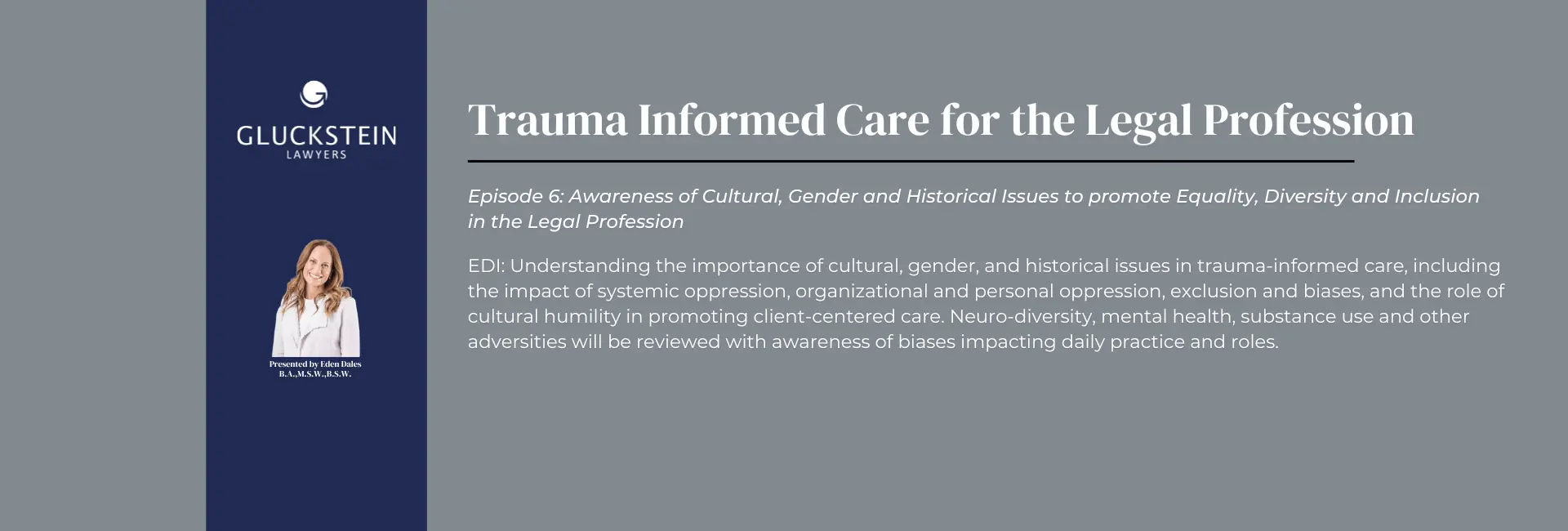
Trauma Informed Care for the Legal Profession Webinar Series: Episode 6: Awareness of Cultural, Gender and Historical Issues to Promote Equality, Diversity and Inclusion in the Legal Profession
"Trauma Informed Care for the Legal Profession" is a 6 part webinar series, focused on the core concepts of trauma informed care (Safety, Trustworthiness and Transparency, Peer Support, Collaboration and Mutuality, Empowerment and Cultural, Historical and Gender Issues).
The webinar will include evidence supporting the relevance of this model, and review how trauma is experienced and the impact of trauma on every day life. The science and neuro-biology will be reviewed, with references to studies and articles published in academic journals. Learning objectives are specified to meet the Law Society’s definition of Continuing Professional Development (CPD) as a means to maintain or enhance a lawyer or paralegal’s professional knowledge, skills, attitudes and professionalism.
Each episode includes a one hour presentation and 30 min discussion.
Accreditation by The Law Society of Ontario:
This program contains 7 hours and 30 minutes of Professionalism content and 1 hour and 30 minutes of EDI Professionalism content.
Learning Objectives:
- Healthy Personal and Professional Boundaries
- Effective Conflict Resolution and interpersonal effectiveness
- Self-Compassion, mindfulness & empathy for sustainable collaboration
- Emotional Intelligence: Emotional Regulation, Self Regulation, Empathy, Support
- Sensitivity training for interviewing, assessing, relating to others (clients, staff)
- The 4 R's of trauma informed care
- Identifying risk factors for trauma, (developmental trauma, Big & Little "t" trauma)
- The impact of trauma on the brain (function, structure, development) over the lifespan
- Sensitivity training skills to prevent re-traumatization
- A review of Adverse Childhood Event's Scale and relevance to legal profession
- Empathy and Authenticity for transparency in legal practice
- The neuro-sequential model for stress reduction
- Tools for a strengths based model to promote resiliency and desired outcomes
- EDI: awareness of trauma, neurodiversity, diversity and challenging beliefs/ "othering" with a model for risk and harm reduction and inclusion
- Discussion of power imbalance, organizational structure and traumatic aspects of the legal profession and tools for change
Module Six Will Cover:
- EDI: Understanding the importance of cultural, gender, and historical issues in trauma-informed care, including the impact of systemic oppression, organizational and personal
oppression, exclusion and biases, and the role of cultural humility in promoting client-centered care. Neuro-diversity, mental health, substance use and other adversities will
be reviewed with awareness of biases impacting daily practice and roles.
- Trauma-Informed Care and Cultural Humility: How trauma-informed care can promote
cultural humility, including understanding the impact of trauma on diverse communities,
recognizing the signs of cultural bias, and developing trauma-informed approaches to
promote cultural humility.
- Trauma-Informed Communication and Cultural Competence: Effective communication
strategies for promoting cultural competence, including active listening, empathy, and
understanding cultural differences.
- Self-Reflection and Cultural Awareness: The importance of self-reflection in promoting
cultural awareness, challenging previously established limiting beliefs, including
recognizing biases and cultural assumptions, being open to feedback, and working
collaboratively with clients to develop solutions.
- How trauma-informed legal practice can promote cultural competence, including
developing trauma-informed policies and procedures that equality, diversity and
inclusion into organizational, systemic and relational aspects of legal practice. How to
approach others who feel excluded, oppressed or victimized with skills for providing
trauma-informed legal services that are culturally sensitive, empathetic, compassionate
towards self and others, and working collaboratively with trauma-informed professionals
who are culturally competent.
- Understanding the impact of historical trauma and inter-generational trauma on diverse communities, including recognizing the signs of trauma and developing trauma-informed approaches to promote healing. A review of epigenetic and generational trauma experiences will enhance knowledge.
Speakers.
-
Eden
Dales, MSW, RSWEden Dales, MSW, RSW is a registered social worker, and the owner and director of Eden Dales Social Work (EDSW), a community- based, trauma-focused social work practice. EDSW is comprised of a dozen registered social workers have expertise in trauma recovery, and conduct assessments, prepare reports, and provide advocacy, brokerage and counselling services to clients in various languages and regions across Ontario. Eden also maintains a private counselling practice in North York, where she lives, for individuals, couples and families. Eden specializes in trauma, stress management, mood management, executive function challenges, concussions, and brain injuries.
